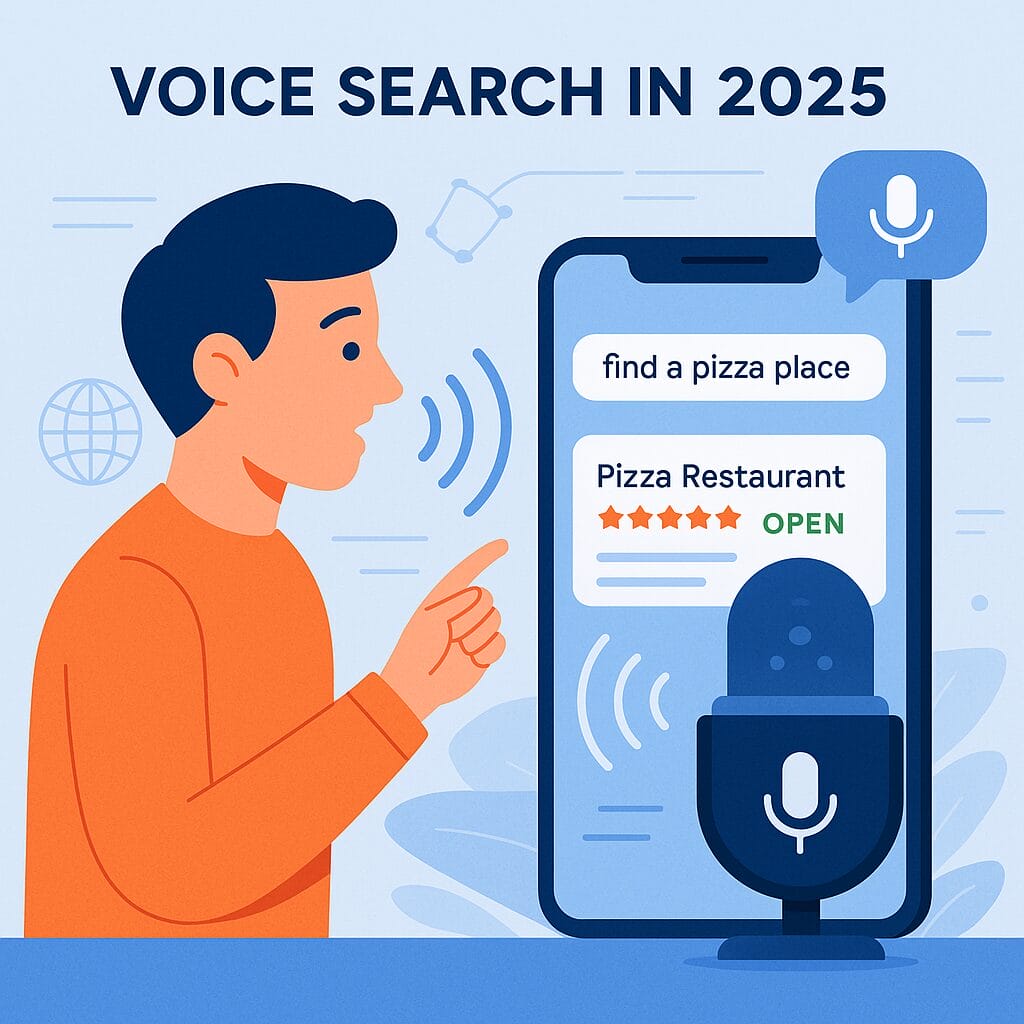
Is Voice Search Finally Taking Over in 2025? How Businesses Can Keep Up
“Hey Siri, find me the best vegan pizza nearby.”
Sound familiar? In 2025, voice search is no longer a futuristic gimmick—it’s how millions of people interact with the web daily. Thanks to smarter AI assistants, faster mobile connections, and smart homes becoming the norm, voice search now accounts for over 50% of all online searches globally .
For businesses, this shift means optimizing for traditional search alone isn’t enough anymore. To stay discoverable (and competitive), brands must now consider how users talk to search engines—not just how they type.

Why Voice Search Is Booming in 2025
In the last few years, voice assistants have become eerily good at understanding natural language. From smart speakers to wearable devices, people are using voice for tasks that go beyond “set a timer”:
- AI-Powered Context Understanding: AI models like GPT-5 (and beyond) help assistants grasp not just words, but intent—making voice commands feel like real conversations.
- Faster Mobile & IoT Devices: With 6G rollouts in some regions and improved smart tech, users are seamlessly using voice anywhere, from their cars to kitchens.
- Hands-Free Convenience: Multitasking is the new normal. People love using voice while driving, cooking, exercising, or even shopping.
Recent reports show that over 60% of Gen Z now prefers voice over typing when searching on mobile devices . Ignoring voice search in your digital strategy? That’s a miss in 2025.
How to Make Your Website Voice Search Friendly
Good news: you don’t need to reinvent your website to catch up with voice. A few key tweaks can make your content voice-friendly:
1. Use Conversational Keywords
People speak differently than they type. Instead of typing “best pizza London,” they say “Where’s the best pizza place in London right now?”
Use natural language phrases and long-tail keywords that match how people ask questions aloud.
2. Answer Questions Directly
Voice assistants love direct answers. Use FAQ sections that tackle common customer questions clearly.
Try to answer “what, where, how, when” in short, concise paragraphs—perfect for voice search snippets.
3. Optimize for Local Search
“Near me” queries are booming with voice. Make sure your Google Business Profile is updated, use local keywords, and ensure NAP (Name, Address, Phone) info is consistent everywhere.
4. Improve Page Speed & Mobile Friendliness
Voice searches often happen on-the-go. A slow or clunky mobile site? Users (and voice assistants) won’t wait. Use tools like Google PageSpeed Insights to boost your mobile speed.
5. Structured Data Is Your Friend
Use schema markup to help search engines understand your content. This increases your chances of being featured in rich voice results.
Common Mistakes to Avoid in Voice Search Optimization
- Ignoring Long-Form Content: Voice favors direct answers and in-depth context. Balance short FAQs with detailed pages that show your authority.
- Neglecting Featured Snippets: Voice assistants often pull from featured snippets. Use headings, bullet points, and structured data to make your content snippet-friendly.
- Skipping Local SEO Basics: If you’re a local business, make sure your location info is crystal clear across your site and platforms.
Voice Search & SEO in 2025: Best Practices
Voice search isn’t replacing SEO—it’s evolving it. Think of it as an extension of your existing strategy, with a focus on natural conversations, local relevance, and fast user experience.
And don’t forget the golden rule: always test your site yourself using voice assistants (Google Assistant, Siri, Alexa) and see how your site shows up.
Final Thoughts
In 2025, voice search isn’t a luxury—it’s how people find things, make decisions, and connect with brands. By adapting your site for voice search now, you’ll not only keep up with trends but also serve your customers the way they expect in this fast-paced, hands-free digital era.
Have you optimized your site for voice yet? Let us know your challenges or wins in the comments!



